
by Lucy | Aug 23, 2018 | biblical counseling, emotions |
God met me at the library. How strange! How crazy and wonderful and amazing!
Twenty-three years old, newly married and out of work, I scanned the shelves for redecorating books. I wanted something, anything, to turn my two-bedroom apartment into a home. Someplace cozy for my husband, Laces (our shy beige kitty) and me. God had another idea. A better idea.
Cradling several books, I felt drawn to the 200s yet jittery like a kid on Red Bull.
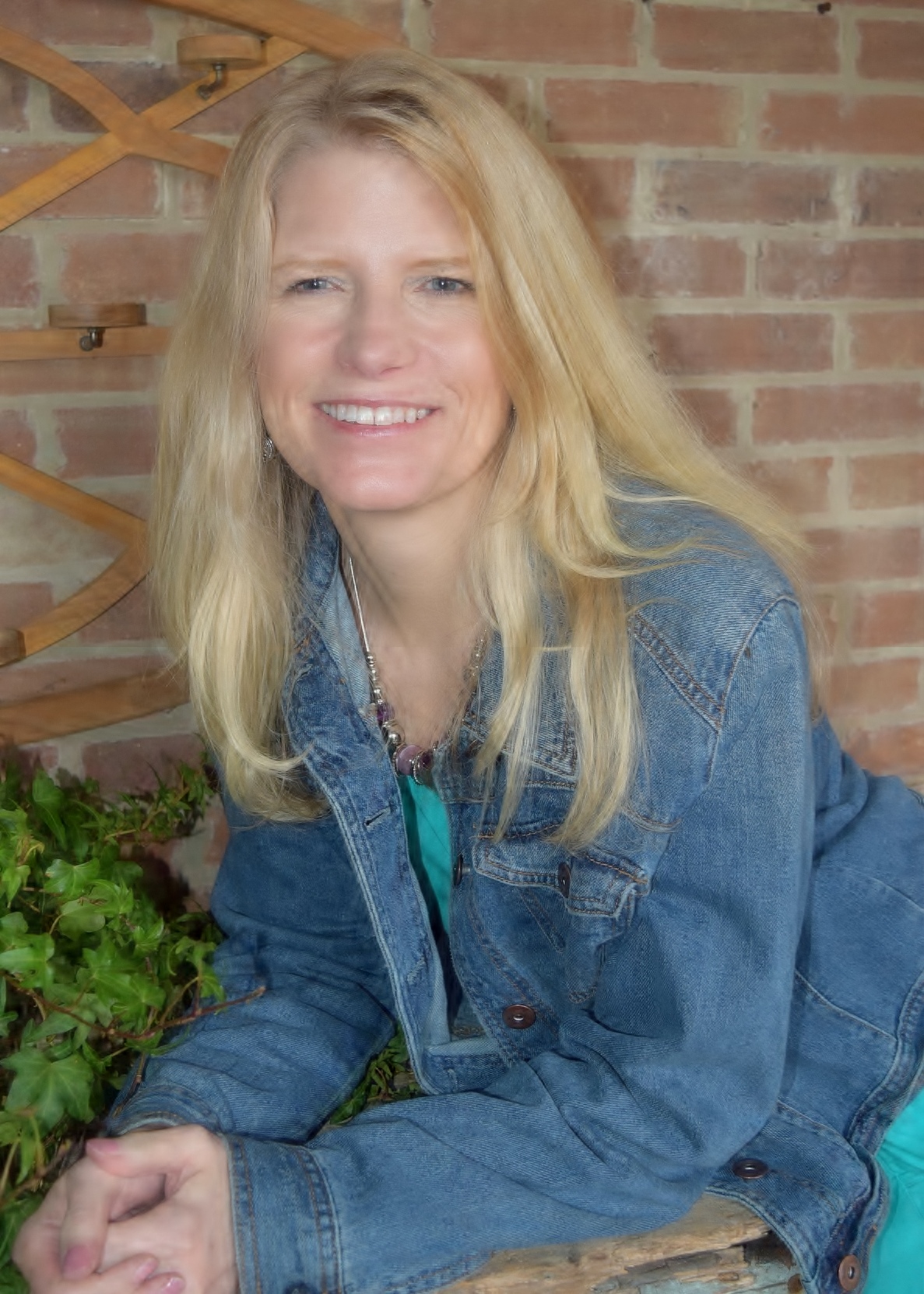
Lucy Ann Moll
Why Am I Here?
Why am I here in the religion aisle? This is strange. Has God brought you to a strange place too to get your attention?
Flanked by books, I slid out Basic Christianity by John Stott. Simple, direct, basic like the title said. So basic I felt stupid. I looked left, right. No one near me. Good. I stuck it back and grabbed a fat book. An important book. That’s better. . .and boring.
Back to Basic Christianity and my spirit quickened. A new problem: What would the check-out clerk think? Seriously, BASIC Christianity. She’ll think I’m stupid. Have you worried about what others think too?
A Holy, Terrifying Moment!
Today, as I look back, I know this moment was holy. God faced the evil one on my behalf. Would I side with God? Or my foolish pride? The serpent appealed to Eve’s ambition to be like God. Would I bow down to pride, fear, self-importance?
You know who won: God. He guided me from the checkout to my apartment, where I devoured the simple book and trusted Jesus to make his home in me. I sensed God’s Spirit in me. A peace and joy I cannot describe replaced my restlessness. When my husband came home, I hugged him big and said, “Guess what I did today, honey?”
Later, I asked to borrow his Bible, a soft cover New Testament that I read over and over and over. God knew I loved books. So he gave me his very best.
Now the Rest of the Story
We each have precious stories of how God wooed us. How did he woo you? Do you remember where you were and what you were doing? Were you in crazy place looking for calm?
As a child I knew emotional pain. Did you have a difficult childhood too?
I leaned toward girls like me. Quiet, shy, invisible girls. Girls with hurts. With secrets. In my early 30s, I tripped into a black hole of depression. God “mothered” me back to life, then whispered a call to my heart, confirmed by scripture. He said, “Bind up the injured” and “strengthen the weak” (Ezekiel 34:16) and led me to study pastoral care to women at Western Seminary, Portland. Later I trained to become a certified biblical counselor through the ABC and then from ACBC.
At last, I knew why God met me at the library. He planned and purposed me to serve him in the role of biblical counselor. As God gave me hope, I counsel hearts to hope. And recenty I’ve been working on my doctorate at Birmingham Theological Seminary. This has opened doors too.
An Offer
Would you like to talk in person or by Skype/Facetime/Hangouts about a solution for your struggle? I’ve counseled people by webcam from California to Cambodia, New York to New Zealand, Houston to Hong Kong, Pennsylvania to Paraguay.You get the idea. I also have offices in greater Chicago where I meet women, couples, and children in person.
Send me a message and we can set up a time to talk by phone, and you can see if biblical counseling is a good fit for you. The best thing about biblical counseling is it’s gospel-centered as well as compassionate. It’s also effective, affordable, and usually very short-term. God loves you so much and wants the best for you.
Counseling Hearts to Hope,

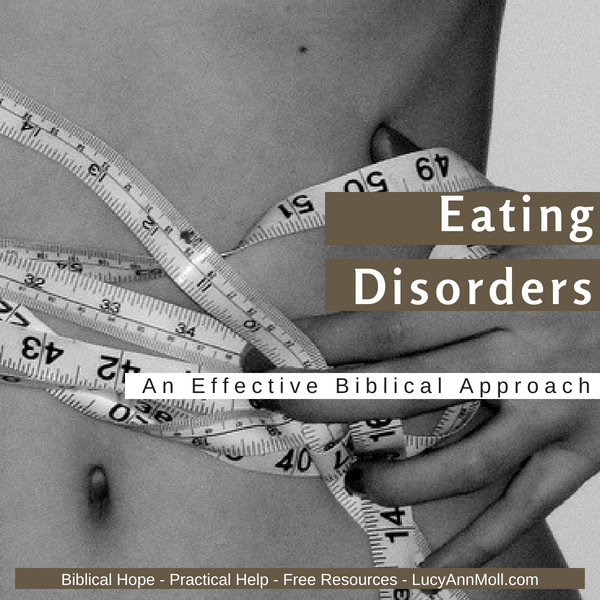
by Lucy | Aug 7, 2018 | biblical counseling, emotions, whole health wellness |
Eating disorders — this problem has a comprehensive Christ-centered solution. It involves biblical counseling and often medical professionals for lasting change. Guest blogger Hayley Satrom, a biblical counselor with HeartSong Counseling in Washington, D.C., shares her article that originally appeared on the Biblical Counseling Coalition website and is used with permission.

As a biblical counselor, I meet with many people whose lives, hearts, and minds are controlled by an obsession with food. Whether anorexia, bulimia, or binge-eating, disordered eating patterns are very common among my counselees. I’ve also found that often they need professional assistance beyond what I alone can provide.
Now, hear me out. I believe there are many counseling issues we biblical counselors can face without additional help from other trained medical professionals. That said, eating disorders, in my opinion, are simply not of that category.
After working with many anorexic and bulimic individuals, I have come to respect, and indeed mandate, a team approach to their care.
A Three-Pronged Approach
It was actually my supervisor, Deepak Reju, who was the first to suggest I utilize what he called a “three-pronged approach” in caring for counselees with eating disorders. “What are these three prongs?” you ask.They are:
- Biblical counselor
- Medical physician
- Nutritionist.
I now live by these three prongs when I counsel folks with eating disorders. Also the additional support has served me well as a counselor, and more importantly, has served my counselees.
Why the Extra Help?
On our best days, I like to think of biblical counselors as “specialists” when it comes to unearthing and tackling heart issues. And we do this by God’s grace—through His Spirit, by His Word, and in His church.
So please hear me that I am well aware that eating disorders are fraught with many heart issues. These heart issues include control, escape, body image distortion, anxiety, depression, distrust of God, confusion about God’s character, fear of man, and the list could go on and on. This list only begins to describe the important themes that a biblical counselor can and should unpack with someone who struggles with an eating disorder.
Is this enough, though? When a woman is abusing her physical body through either deprivation or bingeing of food, is processing heart issues the only help she needs? I can tell you that, from my experience, the answer is “No.”
In fact here are just a few of the ways a physician and nutritionist have come to my aid in counseling folks with eating disorders in the past:
Physician:
- Can tend to the innumerable health problems that are consequential to eating disorders (gastrointestinal disorders, heart problems, low blood sugar, fainting spells, etc.);
- Tests the body for important nutrients that may be low for someone abusing food (e.g. potassium, iron) and can prescribe supplements when needed;
- Will track the patient’s weight over time and can flag if the need for more intensive inpatient care is required;
- Can prescribe psychiatric medication if needed (or a psychiatrist could be used for this as well).
Nutritionist/Dietician:
- Manages everything food-related for the counselee;
- Creates meal plans for breakfast/lunch/dinner/snacks for a typical day and week;
- Provides specific accountability for food-related plans and goals;
- Conducts weekly weigh-ins (often blind to the patient) for the counselor and physician to refer to in monitoring the counselee’s progress.
As you can see, physicians and nutritionists can be of great help to the biblical counselor in caring for someone with an eating disorder. In fact, their support regarding the patient’s health and food needs allows a biblical counselor more freedom to spend the time in counseling appointments on what we do best—tending to the heart issues underneath the symptoms.
How Does It Work?
In practice, I try to meet weekly with counselees who are actively struggling with an eating disorder. I also suggest weekly meetings with their nutritionist for the sake of ongoing help in food-planning and accountability, as well as regular weigh-ins. Weigh-ins are particularly important for anorexic counselees. Their health and even very life are at risk if their weight drops too low.
Physician appointments do not need to be so frequent, unless specified by the doctor. In general, I find it best to allow the physician to lead the conversation on how frequent the patient needs to see him or her. Frequency of visits will depend upon the specific health challenges that exist due to the eating disorder, which is different for every counselee, of course.
I think it is helpful to check in with the physician and nutritionist every month or so to share notes on the counselee and to discuss next steps in coordinating her care.
Linking Hands
As biblical counselors, we provide an invaluable service of helping others change by addressing the heart issues that underlie thoughts and behaviors. We try to lead people to Christ—to know Him, trust Him, and lean into Him for help with even the hardest struggles. This service is necessary and irreplaceable. That said, in some situations we can do more. In fact, in some situations we NEED to do more.
An eating disorder is one of those situations. Eating disorders can be dangerous with many physical health consequences. Let’s link hands with other experienced caregivers who can advise our counselees on certain matters better than even we can. By caring for our counselees’ souls, minds,and bodies surely we will bring much glory to God.
Join the Conversation
- What are your convictions regarding biblical counselors engaging with other care-giving professionals?
- What else have you found to be helpful and effective as you care for individuals with eating disorders?
- Maybe you have even struggled with an eating disorder yourself. What advice would you give to caregivers?
Counseling Hearts to Hope,

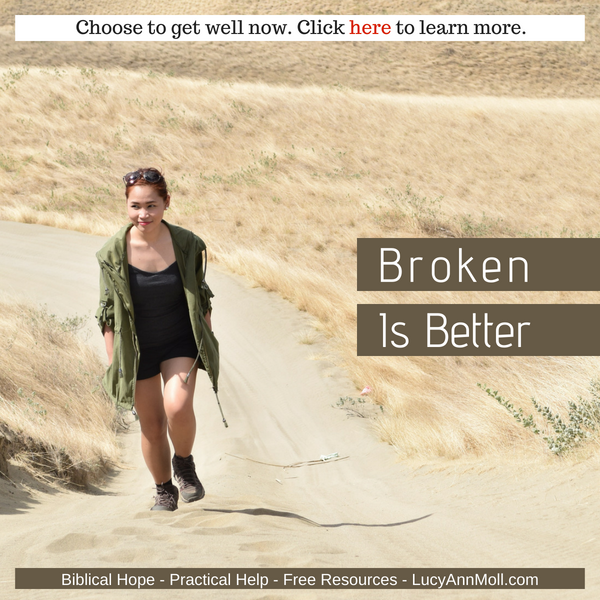
by Lucy | Jul 24, 2018 | biblical counseling, emotions
Broken is better.
Guest blogger Suzanne Holland — see her page HERE on Heart2Heart Counseling Directory — brings home the truth that your reponse to life’s problems is what matters. And a biblically healthy response is what ultimately brings glory to God. Her article appeared first here and is used with permission. –LAM
In This Life, You Will Have Trouble
Life is full of pain and suffering. In a world of uncertainty, there is only one sure thing: You will have trouble.
Yet man is born to trouble
as surely as sparks fly upward. (Job 5:7).
The only thing that is optional is your response to that trouble.
Click & Tweet!
So you have many choices when it comes to how you respond emotionally to pain and suffering in your life. Now I’d like to talk about a few of those, some or all of which you may have chosen in your time of trial. Then I’d like to share a choice that is always better.
Respond with Fear
First, you can respond to your pain with fear. If you have a chronic or debilitating illness, you may be fearful of a new or worsening pain or symptom. And you may begin to wonder what you will do if it continues to get worse.
How will you cope? Who will take care of you? What will you do when you can’t do what you need to do? Fear of increased pain gangs up with panic about the future. Pretty soon, you have bullied yourself into a fear response. This fear drives you more into yourself, and away from God. (For Help for Fear, contact Lucy. She’s been there and tossed the T-shirt.)

Respond in Anger
Or, you may choose to respond in anger, telling yourself that you don’t deserve this, and that it’s not fair.
This response seems more powerful than fear. Instead of cowering in a trembling heap, you shake your fist at your condition, your doctor, or maybe even at God. This anger gives you a false sense of empowerment from within, and causes you to think that you don’t need God’s power. But this puts distance between you and your great High Priest.
Respond with Despair
A third response that is common among suffering believers is despair. Maybe you’ve been knocked down many times, but have managed, by the grace of God, to get back up again. Now, after many TKOs, you have given up. You just don’t have the fight in you anymore.
Somewhere along the way, you started looking to your own strength for the next round. But now that strength is spent. You can’t get up again, and you really don’t even want to. You are done.
Risk Bitterness
All of these responses can lead us to one very dangerous place: Bitterness. A person who is bitter has probably been through all three of these responses, and possibly several others, before arriving at bitterness. When these fleshly attitudes go unchecked, they inevitably lead us to a place where we have little or no faith in God, and we really don’t care.
We are disappointed, angry, and without hope. We nurture and feed grudges against those who have harmed us, and we curse God, and anyone else, who has denied us what we believe we are entitled to. This is bitterness.
According to Isaiah 43:7, we were created for God’s glory.
…everyone who is called by my name,
whom I created for my glory,
whom I formed and made.
If this paragraph describes you, ask yourself, “How does my bitterness glorify God?” If you’re honest, you will have to confess that your bitterness does not, and could never, bring glory to God. In fact, if bitterness persists, and you are just fine with it, you might want to examine whether or not you are even a believer.
A Better Alternative
However, there is another alternative. Rather than becoming bitter, we can confess and embrace the fact that we are broken. Our body is broken. Our heart is broken. We have no strength or power left to fight what God is doing through our trial.
We must submit to His will for us, surrendering our desire to control our situation. So we must hand over our pain, our suffering, our fear, anger, and despair to Him.
He alone is able to handle them. He loves us, and desires to make us more like Him. And he wants to use this pain to bring us into His arms. He wants to take our heavy burden of fear, anger, and despair, and exchange it for His light, easy one.
Plea for Understanding
Dear sister in Christ, you are weak. If you have convinced yourself otherwise, you are deceived. (Jeremiah 17:9). I know you may not like to hear that you’re weak and broken, but please believe me when I say that this is a good thing!
Hear the words of the apostle Paul, who suffered so many things for the sake of the Gospel:
Therefore I take pleasure in infirmities, in reproaches, in needs, in persecutions, in distresses, for Christ’s sake. For when I am weak, then I am strong (2 Corinthians 12:10).
This statement follows Paul’s description of his pleading with the Lord to remove the thorn in his flesh. God’s answer?
My grace is sufficient for you, for my strength is made perfect in weakness (2 Corinthians 12:9).
Do you want God’s perfect strength in your battle against pain and the heartache that comes with it? Do you believe that God’s grace is sufficient for you?
God has given you your weakness as a gift, to help you bring glory to His great name and to make you more like His precious Son! Give in to fear, anger, and despair, and you will be bullied, powerless, and hopeless. Once you get there, you are standing at the doorstep of bitterness.
Turn from these things, my friend, and be broken. Broken is better.
Counseling Hearts to Hope,


by Lucy | Jun 19, 2018 | biblical counseling, thoughts
Meditation: this word unnerves some Christians. They think it is Eastern-New-Age woo-hoo mysticism. But is all meditation … bad?
On the daily it seems a new yoga studio opens in town or a mindfulness article pops up online. In a 2012 survey by the National Institute of Health, 21 million adults and nearly 2 million children practice yoga, a mind-and-body practice with origins in ancient Indian philosophy. Mindfulness has roots in religious and philosophical systems, too.
BUT … Christian meditation focuses on the Word of God (Joshua 1:8; Psalm 1:2). It is a truly awesome Christian discipline when you fill your mind with God’s truths. Underline: fill your mind with God’s truth!
Click & Tweet!
So the important question is this: What are you meditating on? Three quick questions to consider:
- What is Christian meditation?
- Can Eastern meditation hurt you?
- How to begin Christian meditation.
What Is Christian Meditation?
The dictionary’s defines meditation this way: “To focus on one’s thoughts on; to ponder, think on, or muse.” But focus on what? Christian meditation has a very clear focus: God and his glory. Here are a few verses:
Let the words of my mouth and the meditation of my heart be acceptable in your sight, O LORD, my rock and my redeemer. Psalm 19:14
And,
May my mediation be pleasing to Him, for I rejoice in the Lord. Psalm 104:34
Psalm 1:2 and Philippians 4:8 provide answers.
But his delight is in the lawof the Lord,
and on his law he meditates day and night.
Finally, brothers, whatever is true, whatever is honorable, whatever is just, whatever is pure, whatever is lovely, whatever is commendable, if there is any excellence, if there is anything worthy of praise, think about these things.
Can Eastern Meditation Hurt You?

No doubt you’ve heard that meditation lessens anxiety as one empties her mind of the cares of the world and “turns inward.” The focus: your feelings.
But relying on your feelings leads you away from the God’s truth. Here’s a crucial question:
- What happens when you dwell on your fears or difficult circumstances?
You lose your peace, don’t you? And you may forget the freedom you have in Christ. And turning inward and focusing on your feelings, rather than God’s loving truth, creates havoc in your soul, doesn’t it? Your heart may be filled with despair or anger or fear.
The antidote: Meditate on God’s promises and presence!
Colossians 3:2-4 says;
Set your minds on things that are above, not on things that are on earth. For you have died and your life is hidden with Christ in God. When Christ who is your life appears, then you also will appear with Him in glory.
How to Begin Christian Meditation
Christian meditation is focusing on Scripture. Like any new habit, you’ll need to stick with it for it to become second-nature, but you can do it! God will help you! Here are a few ideas on getting started.
Time and Place
Set aside a specific time for reading God’s Word daily. Ideally, choose the same spot to read and meditate on God’s Word. Begin with prayer.
Choose Scripture
It may be tempting to read the latest Christian bestseller. Don’t. Instead, choose a book of the Bible to read through slowly or a section of Scripture.
Read and Reread
Read your selected Scripture once, then read it again. Slow down the second time.
Ask Questions
After reading your selected Scripture twice, ask questions:
- Who is the author and who is he addressing?
- Why is he writing?
- What do the verses say about God? about his audience?
- How does it apply to living a godly life today?
Write a Verse to Meditate On
Now write one of the verses in your selected Scripure to meditate on throughout your day. You may prefer a notecard or the “notes” section of your smartphone.
Pray
Thank God for revealing his truth to your mind. And ask him to help your walk in the loving truth he has revealed.
Counseling Hearts to Hope!

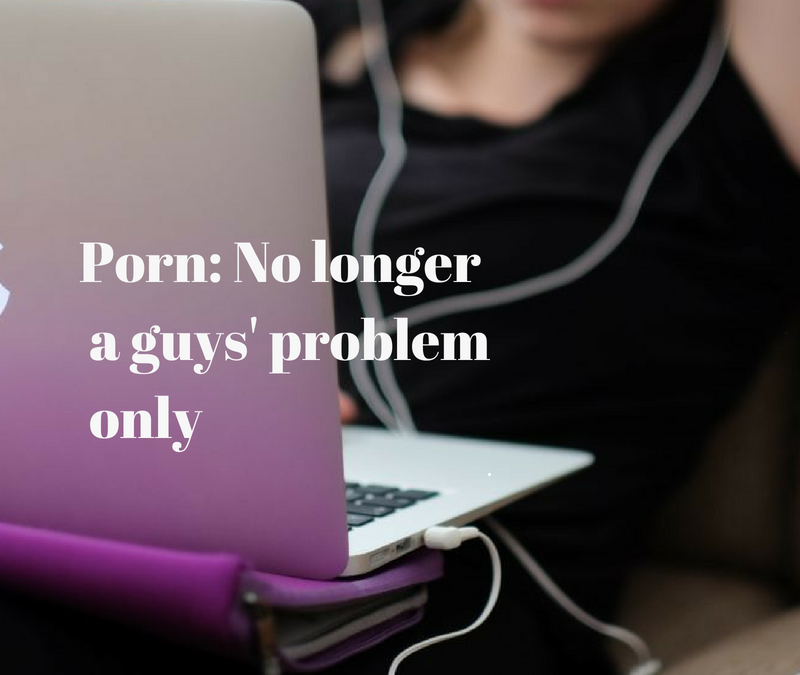
by Lucy | Jun 13, 2018 | biblical counseling, Counselor Resources, emotions, relationships, thoughts |
Women and porn: pornography is not a guys’ problem only. It’s growing exponentially among women, including Christians. In fact, every week or two I counsel yet another woman who struggles with porn.
Skewed Statistics
Truth be told, the statistics on women and porn use fail to tell the full story.
Click & Tweet!
Conservatively, one in five women and girls consume porn. The problem with the numbers starts with defining pornography. Yes, porn includes explicit photos and video. This is hard-core pornography. But there’s other forms!
What about erotica like the 50 Shades of Grey novel? Or how about racy romance novels? Or a Victoria’s Secret catalog? And does sexual fantasy count? Yes, yes, a hundred times yes.
In the words of author-blogger Jessica Harris, a former porn addict:
Pornography isn’t just stored on a computer or found in the pages of a magazine. It buries itself in the mind as memories. In some ways, your own body can serve as a source of pornography.
You may find this blog post uncomfortable to read. Perhaps you’ve already clicked close (and aren’t reading this now). Maybe you even unsubscribed. 🙁 But this topic is essential to know: Your daughters and granddaughters run into pornographic enticements. Every. Single. Day.
Generation Gap!
When it comes to women and porn, there’s a huge difference in porn use and age. Blame the Internet and smart phones.
Says Harris:
Walk into a room with a multi-generational group of men, and you can pretty much assume that the stats on male porn use are going to hold true throughout the generations in the room. Sure, the Baby Boomers grew up on Playboy and the Millennials grew up on smart phones, but still there’s this idea that pornography has been an issue for men for generations.
That is not the case for women.
If I walk into a room with a multi-generational group of women, my first and foremost concern is always to bridge the gap. Because the Baby Boomer women grew up in a time when pornography wasn’t really accessible to them. Nor was it made with them in mind. Their husbands might have been slinking around with magazines stuffed in brown paper bags, but they were not.
Millennial women, on the other hand, came of age at the time of the internet. Not only could we stumble upon a man’s porn stash, now we could access new content all on our own.
Click & Tweet!
Videos even. Without having to subscribe to the adult channels on cable.
Here’s her full post on what the statistics are NOT telling you about women and porn.
Change Is Coming
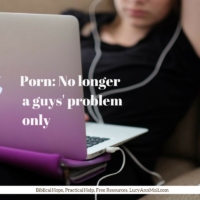 If you hope to gather information about women and porn, you might Google “women and porn” or choose a variation: porn use among women, statistics on women addicted to porn, and so forth. And you’ll get very few hits.
If you hope to gather information about women and porn, you might Google “women and porn” or choose a variation: porn use among women, statistics on women addicted to porn, and so forth. And you’ll get very few hits.
But this is changing.
Among the few resoures is Heath Lambert’s podcast on “Women and Pornography.” You can hear the podcast or read the transcript. There have been a few chapters in biblical counseling books and a booklet or two. I hope to write a book on this subject, God willing. I have a heart for women hooked on porn. Even though it isn’t my story — anxiety and panic attack is part of mine — porn had its hooks in my brother and figures into his binge drinking and also his death. But that’s a story for another time.
Conference Talk on Women and Porn
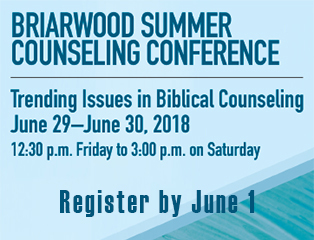 At the end of June I have three talks at Briarwood Summer Counseling Conference: “Trending Issues in Biblical Counseling.” One talk is on self-injury (i.e., cutting and other forms of self-mutilation). And another is on freedom from panic attacks. The third is “Breaking the Bondage of Pornography” (a women only talk). There’s a similar talk for pornography and men.
At the end of June I have three talks at Briarwood Summer Counseling Conference: “Trending Issues in Biblical Counseling.” One talk is on self-injury (i.e., cutting and other forms of self-mutilation). And another is on freedom from panic attacks. The third is “Breaking the Bondage of Pornography” (a women only talk). There’s a similar talk for pornography and men.
I am so happy that I get to speak to female counselors on this topice. With the explosion of internet availability, an ever-increasing number of women are seeking help with porn/masturbation. They often see no way out and have deep guilt and shame. Click here to see the schedule.
Counseling Hearts to Hope,














